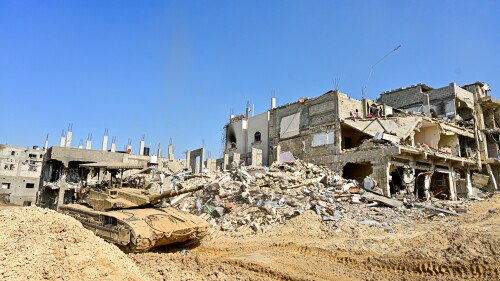US Secretary of State Mike Pompeo and Qatar’s Deputy Prime Minister Mohammed bin Abdulrahman Al Thani sign a memorandum of understanding at the State Department in Washington, D.C. on September 14, 2020. |
Israeli energy minister Yuval Steinitz, speaking to the Ynet website on Sunday, expressed concern that despite Jerusalem’s objections, Qatar will eventually acquire state-of-the-art Lockheed Martin F-35 combat aircraft from the U.S. The minister’s words reflect Israel’s determination to maintain its qualitative military edge over all other Middle Eastern states.
The Israeli desire to prevent any regional state from approaching military parity with it holds for friends as well as foes. A heated discussion was underway regarding the acquisition by the United Arab Emirates of the F-35 stealth aircraft as part of its normalization deal with Israel. Egypt’s efforts to modernize its submarine fleet remain a matter of debate and concern in Israel. Cairo and Jerusalem have been at peace for 40 years.
These concerns derive from Israeli awareness of the volatile and dysfunctional nature of Mideast politics. ...
Qatar pursues a regional strategy hostile to Israel.
Qatar, which hosts the largest U.S. military facility in the Middle East at Al Udeid Air Base, nevertheless consistently aligns with and assists anti-Israel and anti-American forces across the region.
Doha seeks to leverage its connections to both pro- and anti-Western camps to its diplomatic advantage. Its financing of the Hamas enclave in the Gaza Strip is one example. Its apparent payment of ransoms for the release of Western hostages to Syrian Islamist rebel groups that Qatar itself supports is another.
Doha staunchly opposed Israel’s recent normalization with the UAE, Bahrain and Sudan.
Sometimes, Qatar openly sides with the anti-Western forces of Iran and its associates, and of Turkey and the Sunni Islamists of the Muslim Brotherhood. Doha remains staunchly opposed to the normalization agreements recently reached between Israel and the UAE, Bahrain and most recently Sudan. Its influential Al Jazeera satellite news channel offers a non-stop diet of incitement against Israel and the United States. Qatar strongly supported and promoted the short-lived Muslim Brotherhood government in Cairo. It maintains close links with Iran, with which it is jointly developing the Gulf’s North Dome/South Pars Gas Condensate field, the largest natural gas field in the world.
Qatar also maintains a growing strategic partnership with the Turkish government of President Recep Tayyip Erdogan. This alliance between Turkey and Qatar is perhaps the central pillar of Qatari foreign policy. The two countries share a core sympathy for Sunni political Islam, in particular in its Muslim Brotherhood form. They signed a strategic security agreement in 2014, and a Turkish military base was subsequently established in Qatar.
Turkish President Recep Tayyip Erdoğan (left) meets with Qatar’s Emir Sheikh Tamim bin Hamad Al Thani in Doha, Qatar, July 2, 2020. |
Qatar has also assisted Turkey in ameliorating the impact of U.S. sanctions. In 2018, Doha pledged $15 billion in investment in Turkish banks and financial markets. This was payback for Turkey’s efforts in helping the Qatari monarchy break the blockade imposed by neighboring Saudi Arabia and the UAE in 2017 because of Qatar’s support for terrorist groups and too-close relations with Iran. As Turkish journalist Burak Bekdil pointed out in a recent article, a significant component in the growing friendship between Qatar and Turkey, both supposedly U.S. allies, is the assistance afforded the latter by the former in evading U.S. sanctions.
Qatar’s ruling Al Thani family has contributed to the demise of Middle East stability over the last decade. In 2014, Germany’s development minister said Qatar was financing the Islamic State terrorist movement in Syria and Iraq.
In response to a growing list of allegations, the regime of the 40-year-old ruler of Qatar, Sheikh Tamim bin Hamad Al Thani, who was appointed emir by his father in 2013, frequently issues platitudes denying the country is a state sponsor of Islamic terrorism.
Take the most recent terrorist finance operation allegedly conducted by Qatar. The prominent German weekly paper Die Zeit published allegations in July that Doha funded the Shi’ite Lebanese terrorist movement Hezbollah, the Iranian regime’s chief regional proxy, with weapons and cash.
Qatar’s regime mirrors the Islamic Republic of Iran in its efforts to have its hands in as many terrorist cookie jars as possible; in short, both Sunni and Shi’ite terrorist entities. The strategy of the tiny, gas-rich Gulf state is to project as much power as possible across the region.
Qatar has provided a safe haven for the Taliban since at least 2013. This is the relationship to which the Afghan presidential palace referred on Sunday when it said the “Taliban’s links to terrorist networks are still in place.”
Qatar also provided a lavish lifestyle to the then-head of Hamas, Khaled Mashaal, in Doha. Both the U.S. and the EU have designated Hamas a foreign terrorist organization.
All of this helps explain why Israel’s then-ambassador to the United Nations, Ron Prosor, termed Qatar’s Islamist regime the “Club Med for Terrorists” in a 2014 New York Times opinion article. And it illustrates why Israel would be deeply concerned about Qatar acquiring the F-35.
Qatar’s Al Thani regime poses a grave danger to Middle Eastern and international security.
Putting aside Qatar’s atrocious human rights record, including its lethal homophobia, exploitation of workers of color during the build-up to hosting the 2022 soccer World Cup and widespread gender apartheid, the Al Thani regime poses a grave danger to Middle Eastern and international security.
The sale of F-35 all-weather stealth multirole combat aircraft to Qatar would empower the enemies of America in the Middle East. The U.S. should announce, loudly and publicly, that it will not sell F-35s to the state sponsor of terrorism in Doha.
Jonathan Spyer is director of the Middle East Center for Reporting and Analysis and a Ginsburg/Milstein Writing Fellow at the Middle East Forum. Benjamin Weinthal is a research fellow for the Foundation for Defense of Democracies.










